Try our favorite, clean protein powder: See our top pick →
Try our favorite, clean protein powder: See our top pick →
Evidence Based Research To fulfill our commitment to bringing our audience accurate and insightful content, our expert writers and medical reviewers rely on carefully curated research.
Read Our Editorial Policy
We get it, says the world—mushrooms are healthy.
But if ever there were a persistent health fad worthy of persisting, it’s the rise of functional mushrooms—and maitake is very near the front of the field.
In this article, we’ll cover the history of this beloved “dancing mushroom,” its many health benefits, and a couple of tips on getting the most out of maitake as a supplement or a cooking ingredient.
A mainstay of Japanese and Chinese medicinal traditions for millennia, maitake mushroom has long been hailed across Asia (and eventually, elsewhere) as a seriously potent fixer-upper of many an ailment.
Maitake translates to “dancing mushroom” in Japanese. The Buddhist monks who allegedly discovered maitake were so impressed with it, they danced in celebration.
Buddhist monks are also credited with the discovery of monk fruit—you’d think such a humble crowd would stop hogging all the historical milestones!
Maitake is also referred to by the following names, to name just a few:
Perhaps the most common of the nicknames, “hen-of-the-woods” alludes to the layered ruffles of maitake that resemble the feathers of a hen.
Finally, people in lab coats refer to maitake mushroom as Grifola frondosa (G. frondosa).
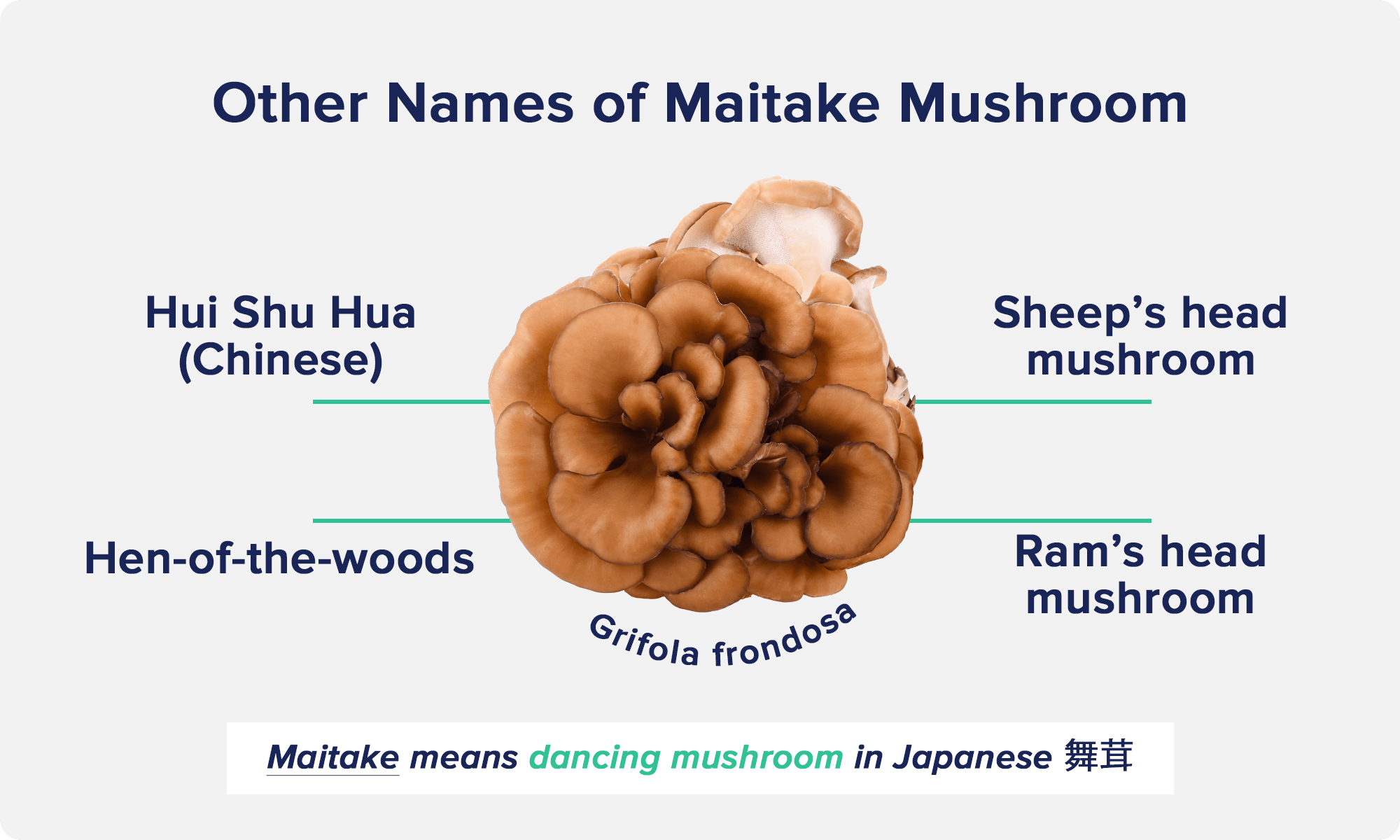
Whatever you call it, maitake is prized among mushrooms for much more than its almost bell-flower-like ruffles, as more and more of this mushroom’s medicinal properties are continuing to surface in research.
Maitake typically grows at the foot of oak trees (dead or alive) in China, Japan, Canada, and a smaller region in North America (northeastern US).
Considering its place of origin, maitake was first enjoyed throughout Japan and China, but has since spread across the world.
For the most part, maitake mushroom supplements stick to the delivery systems we’re all accustomed to, including maitake extract capsules, powder, tinctures, and more.
In supplement form, maitake is frequently paired with other mushrooms, adaptogens, immunomodulators (more on these benefits below), and other ingredients known to support overall health.
The cooking side is where it gets interesting in the case of this highly versatile mushroom; maitake is often served with noodles (especially soba), made into sauces, seared and served whole, and more.
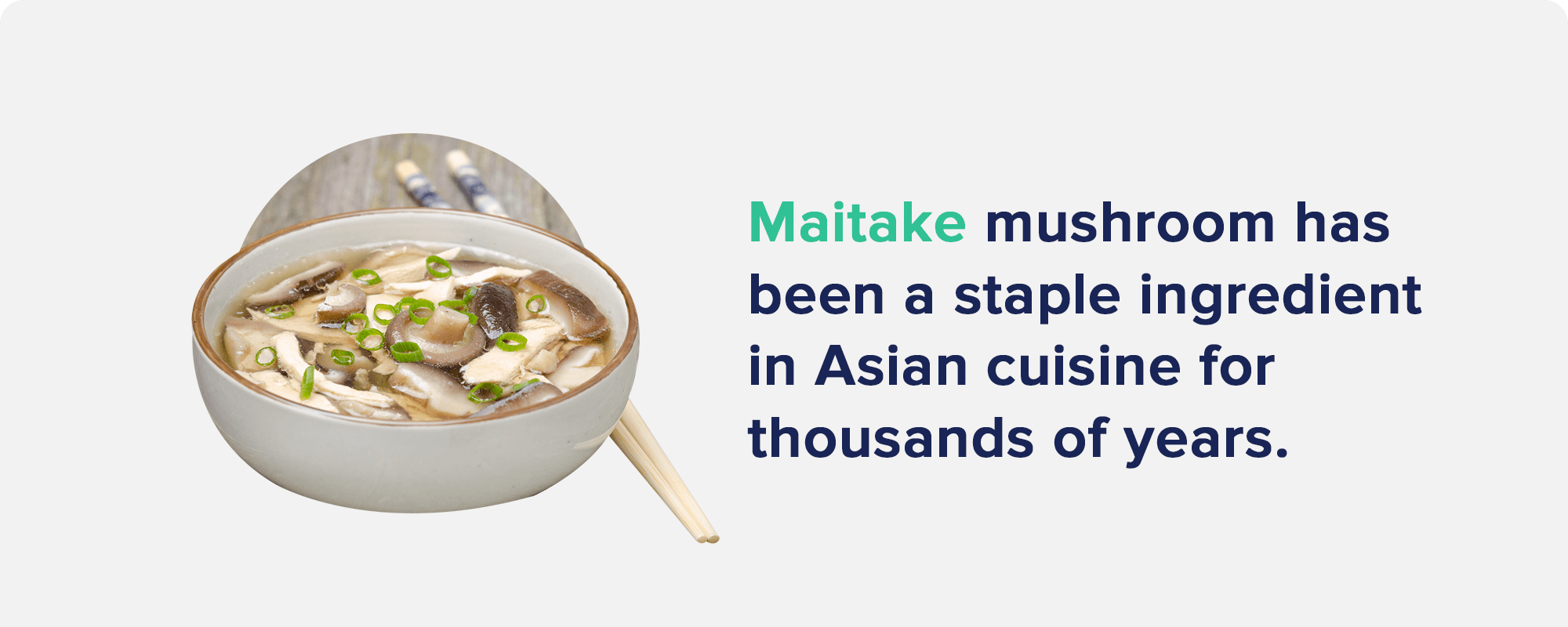
This Bon Appetit article covers some of the most popular applications of fresh maitake today.
Though unique in its flavor profile, maitake is still “mushroom-y” enough to stand in for the white button or other commonly used mushrooms in the hundreds of dishes in which they are used.
It’s all about how you prepare it.
On a final note, since maitake can be absolutely huge (even 100 lbs), the portobello enthusiast who won’t settle for anything less than a palm-sized cap can chow down on maitake like steak.
If you do end up breaking down maitake into smaller pieces, using your hands (to tear it) instead of a knife can preserve that playful, feathery appearance.
Even for a functional mushroom, maitake is showing off some serious medicinal properties as research on its many beneficial compounds continues.
Speaking of, maitake contains polysaccharides, phenolic compounds, and amino acids, to name just a few of its most studied bioactive constituents.
So far, research has demonstrated antitumor, immunomodulatory, antioxidant, cholesterol-lowering, blood-pressure-lowering, and many more properties—here’s a quick overview.
No, maitake is not the “cancer cure doctors don’t want you to know about,” but on the other hand, we’re not talking strictly about adjunctive care for chemotherapy either—maitake does actually have antitumor effects.
These are elucidated in this study from Hong Kong Polytechnic University, which attributes the tumor-suppressing potential of maitake to a group of (polysaccharide) compounds known as β-Glucans.
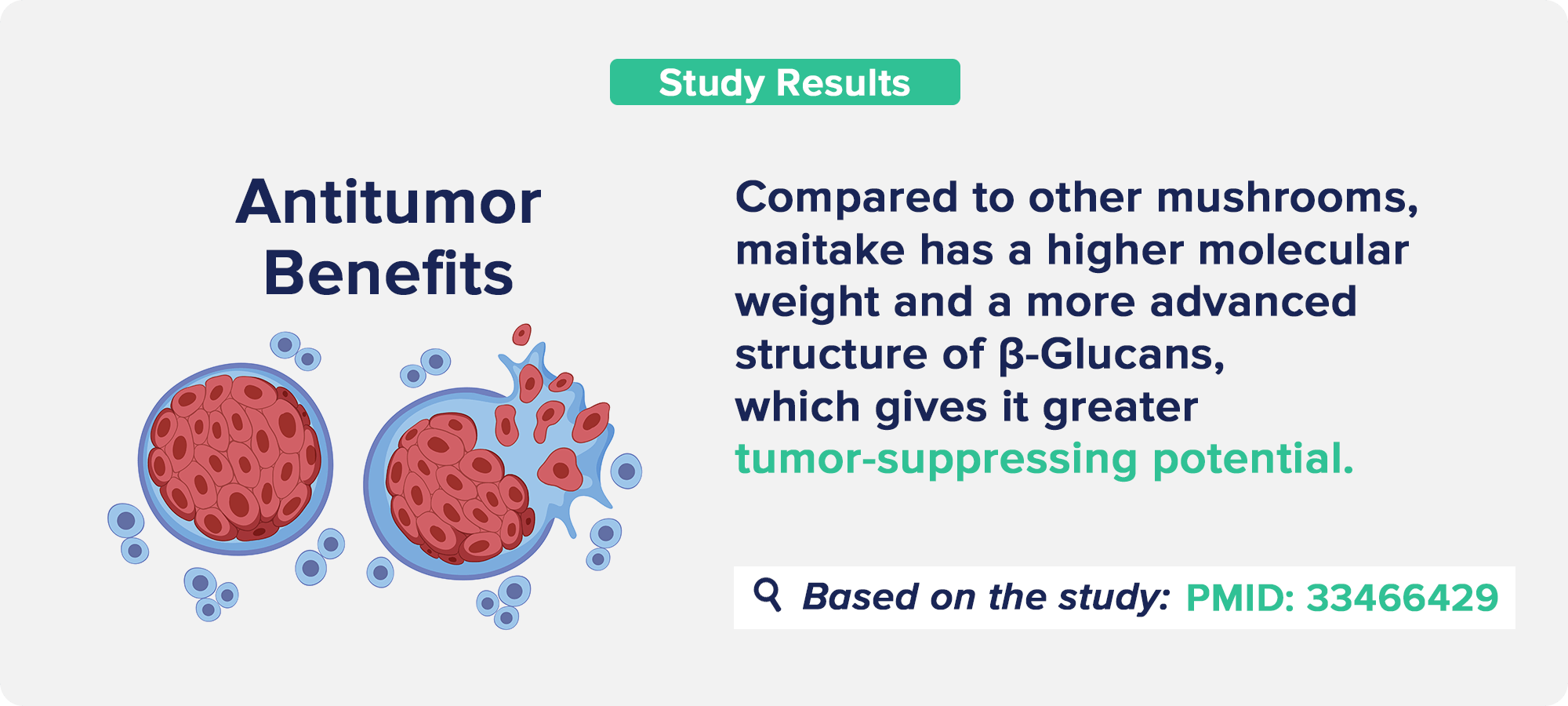
These compounds are certainly not sparse in the mushroom world, but they have a higher molecular weight and a more advanced structure in maitake, with more than one study calling out this distinction.
Maitake is also described as having an immunomodulatory effect, which is a fancy way of saying it can either suppress or enhance the immune system.
Already up against immunosuppression, cancer patients definitely want the latter, which maitake accomplishes by helping macrophages, cytotoxic T-cells, and natural killer (NK) cells do their job—seek and destroy (cancerous cells, of course).
Starting with the fancy word glossary at the beginning this time, hyperlipidemia (high cholesterol) and hypertension (high blood pressure) are two known therapeutic targets of maitake.
Specifically, “progressive hypertension,” as this Georgetown University Medical Center trial put it, was significantly stymied or even reversed (in lab rats) by two different maitake extracts.
Alongside another mushroom (enokitake), maitake was shown in this Obihiro University (of Japan) study to decrease cholesterol levels significantly as compared to placebo.
Importantly, the authors noted two key mechanisms they believed were responsible for this effect: enhanced fecal excretion of cholesterol and facilitating a type of receptor that helps cholesterol enter the cells.
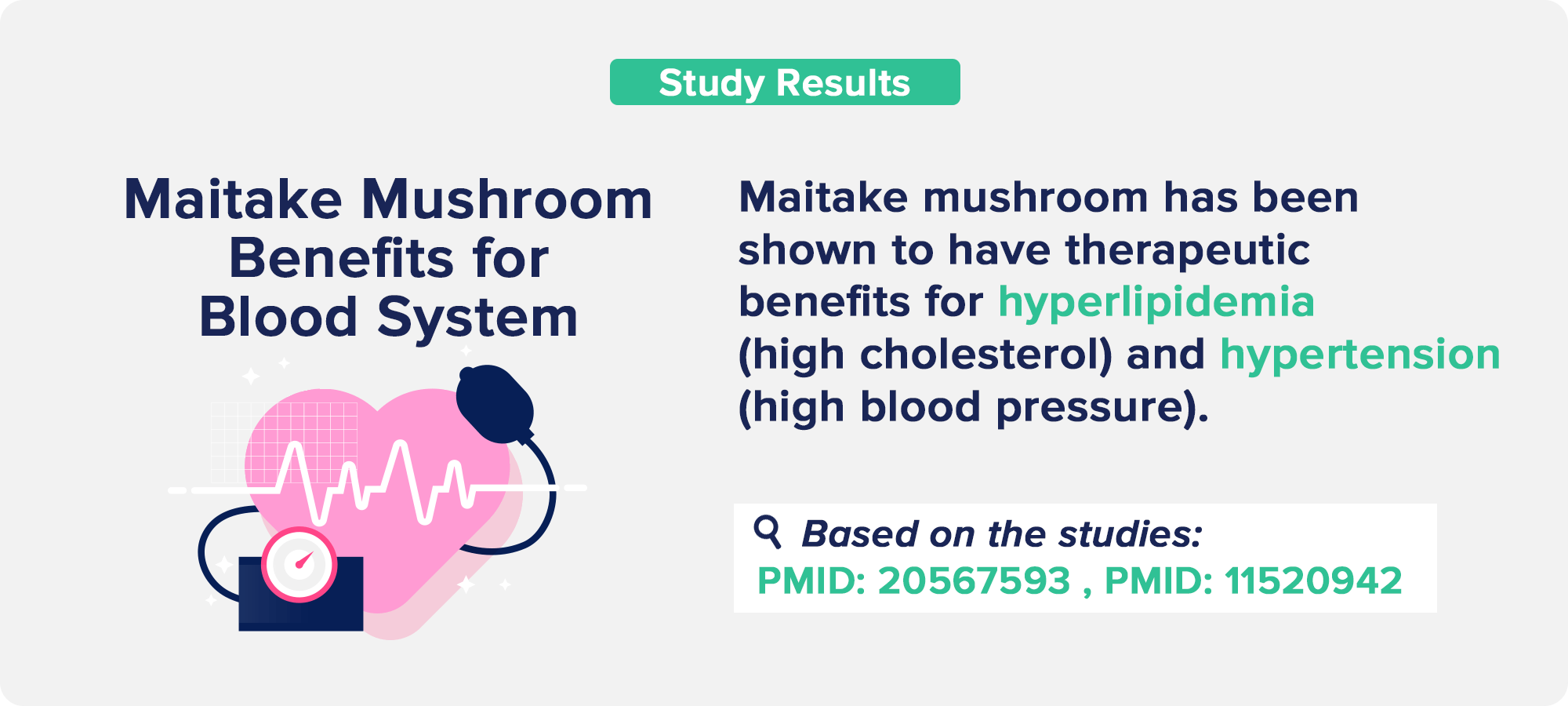
Inflammation is fundamental to most of the above health concerns and literally hundreds of other pathologies, which is why we’re constantly searching for natural agents to manage it.
And wouldn’t you know, maitake has been shown to actively lower the levels of at least one pro-inflammatory compound.
In this case, we’re referencing tumor necrosis factor alpha (TNFa), which our bodies have a love-hate relationship with for its role in both helpful and harmful inflammation.
Remember our Georgetown University rats? In addition to free hypertension treatment, the rats also received a potent anti-inflammatory in maitake, which lowered their levels of TNFa significantly.
To be fair, inflammation is essential for survival, but as most of us learn firsthand by early middle age or sooner, too much of it in the wrong context is no fun.
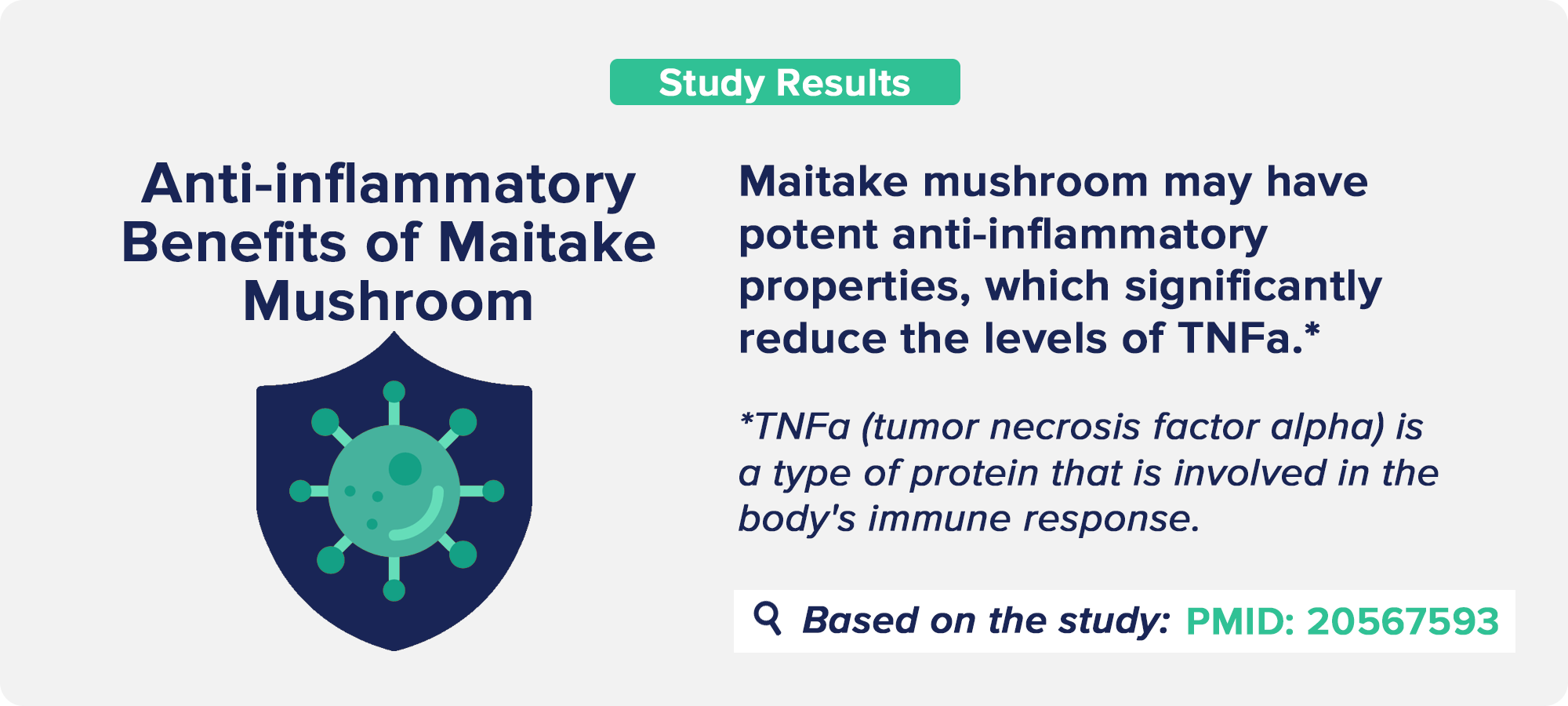
Above is a small sampling of the studies confirming maitake’s most well-established medicinal properties, which include immune-regulating, antitumor, anti-inflammatory and cholesterol-lowering effects.
Maitake is also thought to lower blood pressure, and it has antioxidant effects that can help the body adapt to and/or recover from many different stressors.
There is no objective “line” dividing superfoods from nutritionally inferior foods, but when compared to other foods given this designation, maitake is very much in the same realm, nutritionally speaking.
It is often called a superfood for its rich antioxidant, polysaccharide, and amino acid content.
First, we’ll take one out of the surgeon general’s book and disclaim that pregnant and/or breast-feeding women should always check with their doctors before taking maitake mushroom supplements.
Maitake is also not indicated for people who already have low blood pressure (hypotension), as it may exacerbate the issue.
It can also increase your risk of bleeding, which is a consideration in many different medical situations (after surgery, etc.).
Because maitake affects the immune system, some people with autoimmune diseases or other immune system dysfunctions may need to avoid it.
These are just a few of the larger demographics who should avoid maitake or consult with a doctor first; it is not an exhaustive list.
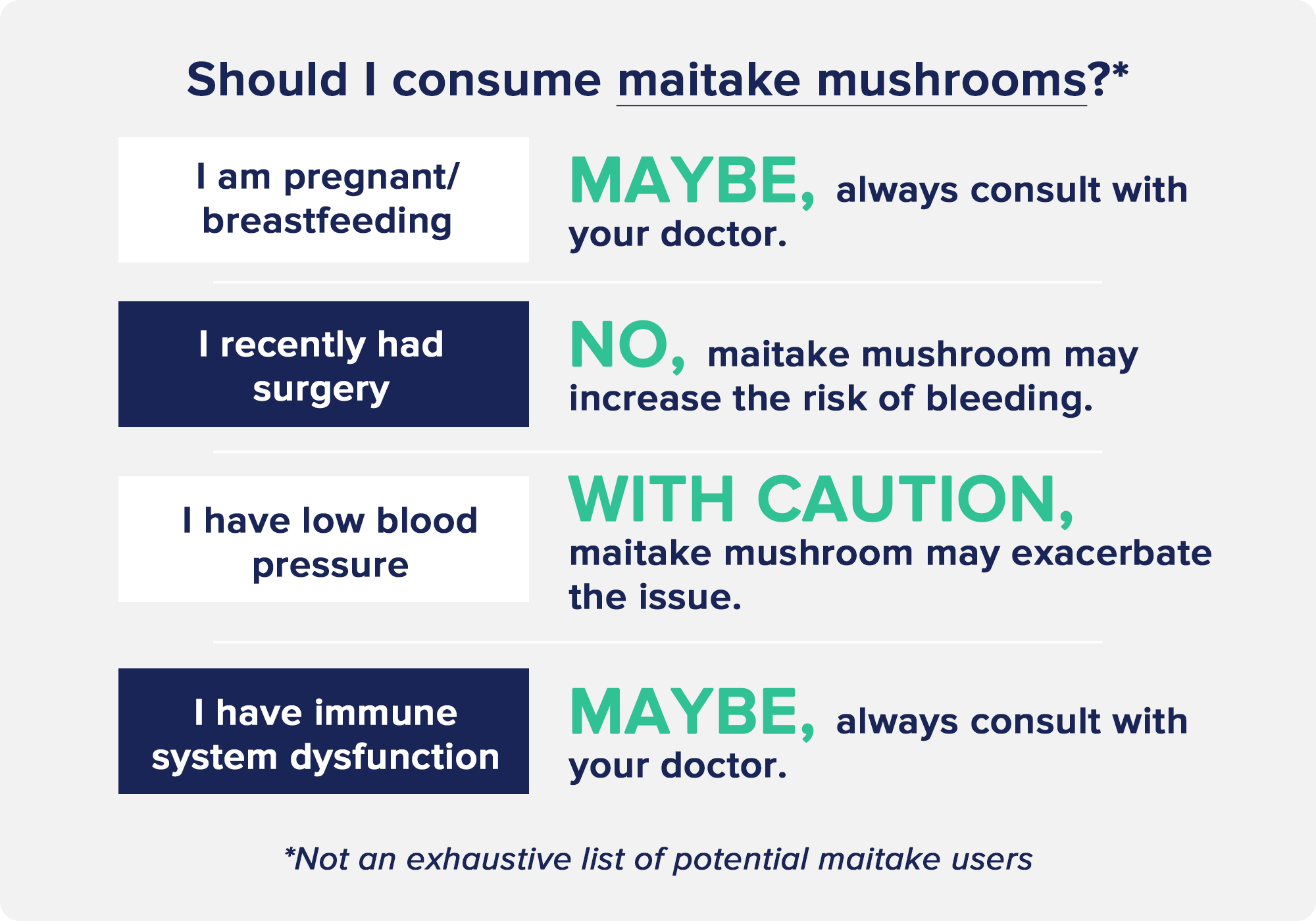
Maitake is considered safe, but is not without risks and/or side effects.
Maitake may increase your risk of bleeding.
It can also lower blood pressure and blood glucose levels, which presents a risky situation for those who already have low blood pressure or blood sugar.
The way maitake interacts with the immune system is often beneficial, but in certain contexts, this may exacerbate the immune disorder or dysfunction.
This is related to maitake’s tendency to cause eosinophilia, which is an increase in a certain white blood cell.
No, maitake and shiitake are different species of fungi.
One of the most immediately noticeable differences is the more classic mushroom “cap” of the shiitake, where maitake have that wavy, frilly appearance.
Maitake is a prized species of mushroom discovered in Japan, popularized throughout Asia, and now known the world over.
Also known as “hen-of-the-woods,” maitake have a wavy, frilly structure, and are so dense in nutrients that they eclipse many functional mushrooms when it comes to health benefits.
So far, maitake has been indicated as a powerful treatment for high blood pressure, high cholesterol, cancer (including antitumor effects and chemotherapy support), and many other issues or disorders.
You can use maitake as a food ingredient or as a supplement; it’s commonly available in capsule or powder form.
Subscribe now and never miss anything about the topics important to you and your health.